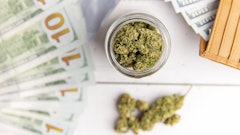
Last year, the team at Gb Sciences and a cohort of researchers at Michigan State University announced positive results from ongoing study into cannabinoid-based treatments for cytokine release syndrome (CRS). The work continues into 2022, with a paper awaiting publication, but the good news arrived at the onset of the omicron variant of COVID-19 sweeping across the globe.
CRS is a symptom of viral diseases like COVID-19, one that puts the body’s immune response to inflammatory infection into hyperdrive.
The joint study is analyzing the ability of cannabinoids (and certain cannabinoid combinations) to dampen viral hyperinflammatory responses—much like the cellular response to COVID-19, which gives this cannabis-related research a particular urgency. Cytokines are released by the body to draw immune attention to a viral infection, but, to put it simply, too many cytokines is not good.
“When the cytokine systems get out of whack, you end up bringing too much of the immune system to bear on a particular region, and then you have problems,” Dr. Andrea Small-Howard, president and chief science officer of Gb Sciences, says.
Targeting CRS, then, is seen in this study as one way of treating COVID-19.
RELATED: Beyond the Show: Dr. Andrea Small-Howard
For Gb Sciences’ part, the company is using its AI-driven drug discovery platform to identify cannabinoid-containing formulations that are meant to reduce cytokine levels triggered by a SARS-CoV-2 infection—all while maintaining a proper level of cytokines to manage the body’s natural immune response. It’s a hypothesis that puts cannabis-based medicine at the site of an inflammatory response, ameliorating certain symptoms of the disease.
The research team examined cytokine profiles in patients who were experiencing life-threatening systems, then attempted to match 24 different cannabinoid formulations to down-regulate those responses. Those formulations contained two to five ingredients at specific ratios, with some of them including THC.
“It's not just the kind of ingredients that are in the mixtures, it's the ratios that are super important when it comes to how they're going to act in the body,” Small-Howard says. “We had those 24 candidates, all of which were able to immune-modulate—meaning alter the immune profiles—but eight of them turned out in the way that we really had hoped for, which is that it left those early anti-viral reactions intact.”
In December, the research team announced as much: One-third of the proposed cannabinoid-containing formulations seemed to dial back the body’s natural immune responses while still maintaining proper cytokine levels to continue managing the infection.
This research grew out of the work of Norbert Kaminski, who had been following a group of patients with HIV/AIDS, some of whom were using medical cannabis.
As Small-Howard explains, many HIV patients who take medication will find that the virus itself is undetectable. For some, the virus can manifest in the brain and cause HIV-associated immunodeficiency syndrome, which has been linked to inflammation secondary to the effects of the HIV virus elsewhere in the body. Kaminski’s studies progressed, and the application of cannabinoid-based therapies proved useful in similar cases.
“When the early days of the pandemic came rolling around, we were like, ‘You know what? We have this huge data set that helps to define how different cannabis ingredients interact in this cascade of inflammation,” Small-Howard says. “We took some of the information that we had from the HIV project, and we adapted it. What people have described, people who are researchers on the front lines looking at COVID, is that the COVID vaccine interacts with the immune system differently than some of the other viruses.”
It’s a basic principle of immunology, then, that the study is examining, with the hope that cannabinoids’ antagonism of the body’s endocannabinoid system can play a role in managing disease symptoms.
“If you have a viral infection and you're suffering from it, it's not the virus itself that causes problems,” Small-Howard says. “It's our body's immune response to the virus. The strategy of getting in there and trying to regulate our immune responses to a virus is a valid strategy—not just for COVID or HIV but for almost any virus.”
Recently, cannabis and COVID-19 have shared press for several emerging studies. The most notable viral headline involved CBD, which, according to Oregon State University research, prevents the protein spikes of the SARS-CoV-2 coronavirus from infecting cells.
But, regardless of what the wave of social media attention might have implied, it’s not as simple as smoking CBD-rich flower or using a tincture with a high-CBD cannabinoid profile. This is where Gb Sciences’ drug discovery platform comes in, with the ratios and algorithmic recipes that Small-Howard mentioned as part of the ongoing work with Michigan State University. Cannabinoids are complex compounds, with different levels of different chemicals setting off different chain reactions of different effect within different individual users.
Last year’s studies were done by using the donated blood of human subjects, and the research team ended 2021 with another round of optimization of those ingredient ratios. Next up: targeting human subjects.
“It's not like this is going to happen immediately, but we're focused on this because there's a growing need, due to these variants from COVID,” Small-Howard says. “But the same mechanism is how a lot of the viruses end up being so damaging to humans. It’s a kind of therapy that, once we have some good therapeutics tested, we can keep in our back pocket for the next time a pandemic comes along.”
























